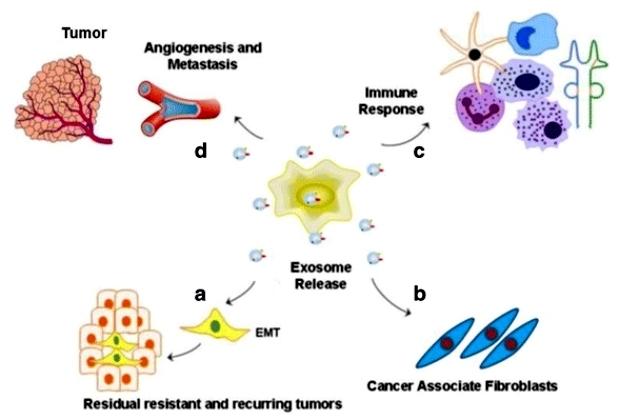Exosome Proteomics in Disease Research
Exosomes contain essential proteins, and examining the protein makeup of exosomes aids in the research of exosome function. Exosome proteomics can be used to identify proteins linked to diseases as biomarkers for early diagnosis and prognostic evaluation of diseases, as well as to explore the role of exosomes and proteins in life activities such as disease start and progression.
Share this Post to earn Money ( Upto ₹100 per 1000 Views )
Exosome proteomics,as one particularly interesting avenue of research providing the deeper insights into the complex molecular mechanisms behind various diseases. Creative Proteomics is a company with many years of research and service experience in biological research, and we are committed to being at the forefront of exosome proteomics exploration, constantly advancing the understanding of exosomes in disease mechanisms and paving the way for innovative diagnostic and therapeutic approaches.

Applications of Exosomal Proteomics in Disease Research
Unveiling Disease-Specific Biomarkers
Exosomes, small extracellular vesicles secreted by various cell types, serve as intricate messengers in intercellular communication. Their cargo, including proteins, nucleic acids, and lipids, reflects the physiological state of the originating cells. Leveraging the prowess of exosomal proteomics, Creative Proteomics has unearthed a treasure trove of disease-specific biomarkers. These biomarkers, such as aberrantly expressed proteins or post-translational modifications, hold immense potential for early disease detection and precise monitoring. For instance, in a recent study focused on breast cancer, Creative Proteomics identified a panel of exosomal proteins exhibiting consistent alterations in patients with different stages of the disease, offering a promising avenue for non-invasive diagnostics.
Deciphering Mechanisms of Pathogenesis
The intricate orchestration of molecular events underlying disease pathogenesis often remains shrouded in mystery. Here, exosomal proteomics emerges as a powerful tool, unraveling the intricate web of signaling cascades and molecular interactions. Creative Proteomics has harnessed this potential to elucidate the mechanistic underpinnings of various diseases, ranging from neurodegenerative disorders to cardiovascular ailments. Through comprehensive proteomic profiling of exosomes isolated from diseased tissues, researchers at Creative Proteomics unveiled the dysregulated pathways and key molecular players contributing to disease progression. Such insights not only deepen our fundamental understanding but also open avenues for targeted therapeutic interventions.
The Value of Exosomal Proteomics in Disease Research
Exosomal proteomics is of immense value in disease research, providing a multifaceted approach that contributes to a deeper understanding of disease mechanisms, precision medicine and improved clinical outcomes. Exosome proteomics offers several values for the field of disease research.
Precision Medicine Revolution
In the era of precision medicine, tailoring treatments to individual patients' unique molecular profiles is paramount. Exosomal proteomics, with its ability to capture the heterogeneity of disease manifestations, propels this revolution forward. Creative Proteomics has harnessed exosomal proteomics to delineate distinct subtypes within seemingly homogeneous diseases, enabling the stratification of patients based on their molecular signatures. This stratification empowers clinicians to prescribe personalized therapies, maximizing efficacy while minimizing adverse effects. In a groundbreaking study, Creative Proteomics contributed to the identification of exosomal protein markers that differentiate between responders and non-responders to a novel anticancer therapy, exemplifying the potential of exosomal proteomics in tailoring treatments.
Early Disease Detection and Prognosis
Exosome proteomics offers an innovative approach for early disease diagnosis and prognosis, which is essential to increasing patient survival. Traditional diagnostic techniques frequently rely on identifying clinical symptoms, which may not manifest until late in the course of the disease. Exosomes can offer early insights into pathological alterations taking place in the body since they are bearers of disease-specific molecular payloads. This capability is used to detect minute proteome alterations in exosomes before the appearance of clinical signs.
For instance, when investigating the use of exosomal proteomics in Alzheimer's disease (AD) research, researchers discovered distinctive protein signatures linked to AD pathology by examining the exosomee protein profiles of pre-symptomatic individuals. This skill for early detection has the potential to transform illness screening systems, enabling prompt interventions and better management techniques.
Mechanistic Insights into Disease Pathogenesis
Exosome proteomics has emerged as a powerful tool to elucidate these complex pathways and molecular interactions. Exosome proteomics has been utilized to dissect the molecular basis of a wide range of diseases, from neurodegenerative diseases to cardiovascular diseases.
By carefully analyzing the exosome proteome from diseased tissues, it can be used to uncover dysregulated pathways, key protein players, and complex molecular crosstalk in disease progression. These insights provide a comprehensive roadmap for understanding disease onset, progression and potential therapeutic targets. For example, in a study on heart failure, Creative Proteomics elucidated key exosomal proteins involved in myocardial remodeling, revealing potential pathways for therapeutic intervention.
Advancing Biomarker Discovery
Biomarkers play a critical role in disease diagnosis, prognosis, and assessment of treatment response. Due to the dynamic nature of exosome cargo components, exosome proteomics provides a rich source of novel biomarker candidates. Creative Proteomics has pioneered the identification of disease-specific exosomal protein markers that contribute to the development of innovative diagnostic tools.
In a recent study of infectious diseases, Creative Proteomics discovered that exosomal proteins exhibit dynamic changes in response to pathogen exposure. These proteins are expected to serve as early indicators of infection, paving the way for rapid and accurate diagnostic analysis. This biomarker discovery effort has the potential to change the disease detection paradigm and enhance clinical decision-making and patient outcomes.
 Role of exosomes in sustaining cancer resistance networks (Li W, et al,. 2017)
Role of exosomes in sustaining cancer resistance networks (Li W, et al,. 2017)
Exosomal proteomics plays an important role in the field of disease research, providing insights into the complexity of molecular associations between various pathologies. Creative Proteomics has years of expertise and advanced technologies in exosomal proteomics research. From unraveling disease mechanisms to identifying novel biomarkers and driving the precision medicine revolution, exosomal proteomics is reshaping healthcare. We continue to accelerate innovation in exosome research, elucidating the molecular basis of disease and advancing early detection and personalized therapies.
References
- Li W, Li C, Zhou T, Liu X, Liu X, Li X, Chen D. Role of exosomal proteins in cancer diagnosis. Mol Cancer. 2017;16(1):145.

 dorawest123
dorawest123 













